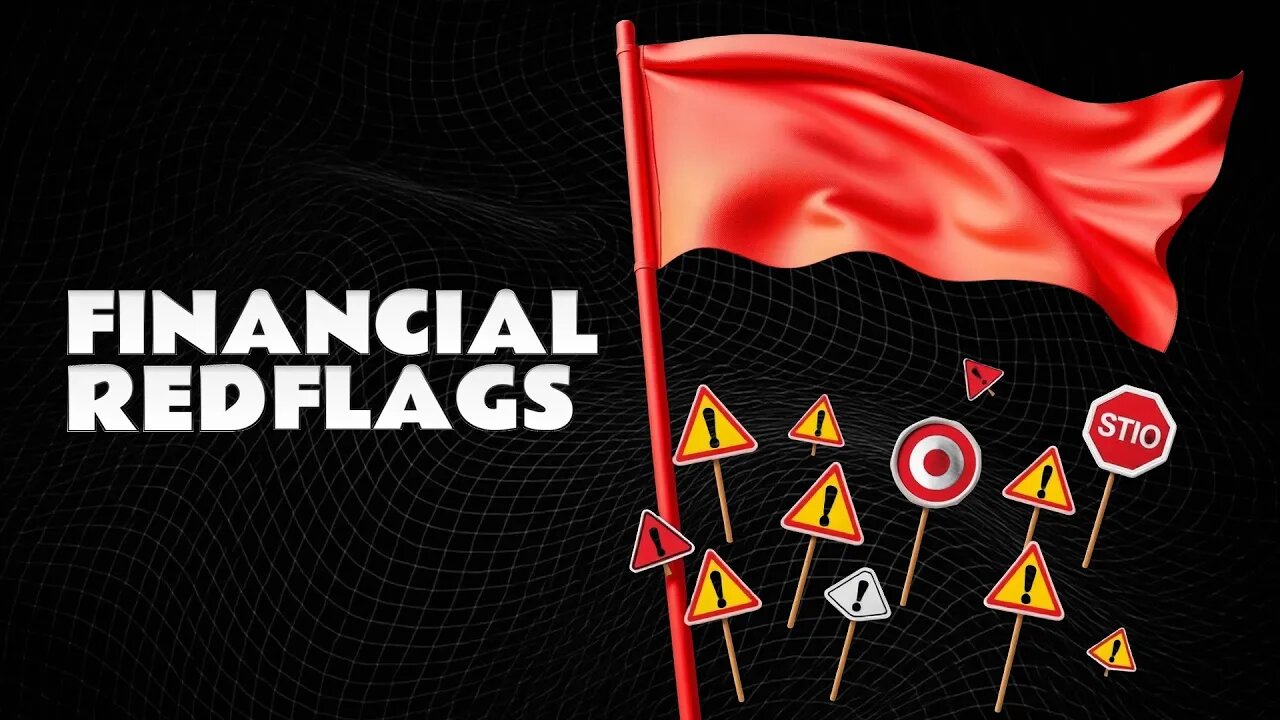Premium Only Content

Financial Red Flags: Signs You're Heading for Trouble
Financial stability is a cornerstone of personal and professional success, but it can be surprisingly easy to overlook the warning signs that indicate you might be heading for trouble. Recognizing financial red flags early can help you take corrective action before minor issues escalate into major problems. Here are some key indicators that your financial health may be at risk:
1. **Living Paycheck to Paycheck**: If you find yourself constantly waiting for your next paycheck to cover basic expenses, it's a clear sign that you're not saving enough. Building an emergency fund should be a priority to provide a financial cushion for unexpected expenses.
2. **Excessive Debt**: High levels of debt, particularly from credit cards or personal loans, can quickly spiral out of control. If your debt-to-income ratio is high, it's crucial to create a debt repayment plan to regain financial stability.
3. **Ignoring Bills**: Delaying or ignoring bills is a dangerous habit that can lead to late fees, higher interest rates, and damaged credit scores. Ensure you have a system in place to pay bills on time.
4. **No Budget**: Operating without a budget makes it difficult to track your spending and savings. Creating a budget helps you allocate your income effectively and identify areas where you can cut back.
5. **Overspending**: Consistently spending more than you earn is unsustainable. Review your spending habits and identify non-essential expenses that can be reduced or eliminated.
6. **Lack of Savings**: Without savings, you're vulnerable to financial shocks such as job loss, medical emergencies, or home repairs. Aim to save at least 20% of your income for future needs and investments.
7. **Using Credit for Daily Expenses**: Relying on credit cards for everyday purchases can lead to a cycle of debt. Try to use cash or debit cards for daily expenses to avoid accruing interest.
8. **No Financial Goals**: Setting financial goals, whether short-term or long-term, provides a roadmap for your financial future. Without goals, it's easy to lose focus and fall into bad financial habits.
9. **Inadequate Insurance**: Lack of proper insurance coverage can leave you exposed to significant financial risks. Ensure you have adequate health, auto, home, and life insurance to protect against unexpected events.
10. **Avoiding Financial Conversations**: Open communication about finances with your partner or family is essential. Avoiding these conversations can lead to misunderstandings and poor financial decisions.
Addressing these red flags requires a proactive approach. Start by assessing your current financial situation, setting realistic goals, and creating a plan to achieve them. Seeking professional financial advice can also provide valuable guidance and support. By taking these steps, you can turn around your financial situation and build a stronger, more secure future.
Tags:
Financial stability, Debt management, Budgeting, Emergency fund, Overspending, Savings, Credit card debt, Financial goals, Insurance, Financial planning
-
 LIVE
LIVE
Side Scrollers Podcast
2 days ago🔴SIDE SCROLLERS FUND-A-THON🔴DAY 2🔴100% REVENUE HELPS CHANGE CULTURE!
2,199 watching -
 6:14
6:14
Dr Disrespect
20 hours agoDr Disrespect Goes for 100 KILLS in Battlefield 6
75.3K8 -
 17:58
17:58
Scammer Payback
16 hours agoParental Controls vs Scammer
12.3K1 -
 5:23
5:23
Esports Awards
17 hours agoZYWOO’s CRAZY ACE & ASPAS CLUTCH keeps MIBR ALIVE at CHAMPIONS | Esports Play of the Month September
1.73K1 -
 LIVE
LIVE
FyrBorne
9 hours ago🔴Battlefield 6 Live M&K Gameplay: Coffee and Chaos, The Chase For Weapon Mastery
38 watching -
 1:13
1:13
OfficialJadenWilliams
15 hours agoChatGPT, hack into the Pentagon
4.19K3 -
 4:43
4:43
MudandMunitions
1 day agoGlock’s BIGGEST Marketing Trick Ever? The ‘Discontinued’ Strategy Exposed!
2.38K3 -
 16:25
16:25
Actual Justice Warrior
1 day agoAfrican SCAMMERS Steal Millions From Medicaid
15.6K17 -
 43:16
43:16
Coin Stories with Natalie Brunell
17 hours agoBitcoin Will Power the Internet of Money and Tokenize Real World Assets with David Marcus
11.1K4 -
 30:18
30:18
James Klüg
1 day agoTalking To ANTIFA At Portland ICE Facility
14.3K23